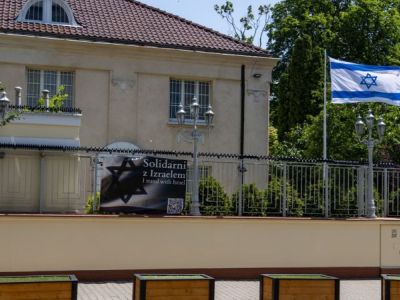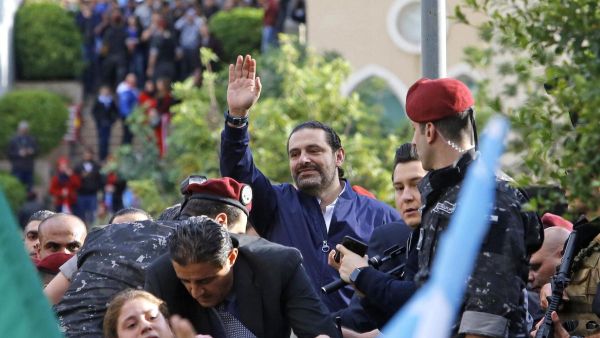The flagging Cabinet formation process came to a standstill Monday in the absence of contacts to overcome obstacles facing Prime Minister-designate Saad Hariri in his endeavor to put together a new government of specialists to deliver reforms urgently needed to unlock promised international aid to the crises-ridden country.
Hariri, who used to meet with President Michel Aoun regularly since he was designated on Oct. 22 to form a new government, has not met the president for more than a week.
The lack of recent meetings between Aoun and Hariri signal enduring differences over two major topics that have stalled the formation: the distribution of key ministerial posts among various sects and deciding who names Christian ministers in an 18-member Cabinet of nonpartisan specialists to be tasked with implementing urgent reforms contained in the French initiative designed to lift Lebanon out of its worst economic and financial crisis since the 1975-90 Civil War.
Human Rights Watch says a COVID-19 lockdown in Lebanon requires the government to ensure “adequate food, water, health care and other basic needs” for the people, adding that the last lockdown in March and April “exposed the inadequacies of Lebanon’s social protection system.”
— L'Orient Today (@lorienttoday) November 10, 2020
“The parties’ struggle for public-services related ministries, such as the Health, Public Works, Telecommunications, Education and Social Affairs portfolios, is hindering the Cabinet formation,” a political source familiar with the process told The Daily Star Monday.
Likewise, Aoun and Hariri’s disagreement on who should name the nine Christian ministers in the next Cabinet is posing another hindrance to formation, the source said.
The absence of internal contacts to break the weekslong Cabinet impasse came after a special envoy of French President Emmanuel Macron failed to make any progress in his talks with Lebanese leaders on the formation of a new reform-minded government, further dashing hopes for the formation anytime soon.
Patrick Durel, an adviser to Macron for Middle East and North Africa affairs who paid a two-day visit to Lebanon last week, reportedly delivered an ultimatum for rival Lebanese factions to act to quickly form a new Cabinet of specialists to deliver reforms, or else the cash-strapped country risked losing the chance to secure promised international aid.
Lebanese attention is focused on two important meetings to be held in Paris Monday. The first meeting between U.S. Secretary of State Mike Pompeo, who arrived in Paris Sunday as part of a regional tour, and Macron and French Foreign Minister Jean-Yves Le Drian to discuss developments in the region, including the Lebanese crisis.
Ahead of his meeting with Macron, Pompeo held talks with Le Drian that covered, in addition to the importance of Transatlantic alliance and NATO unity, Hezbollah’s growing influence in Lebanon, long viewed as a major irritant by Washington.
Pompeo renewed his call for the formation of a reform-focused government in Lebanon. “Secretary Pompeo also discussed [with Le Drian] the need to combat violent extremism and highlighted Hezbollah’s malign influence in Lebanon, as well as U.S. efforts toward a stable and reform-focused government there,” Deputy spokesperson Cale Brown said in a statement.
Pompeo and other US officials have publicly supported the French initiative in Lebanon, but they opposed Hezbollah’s participation in the new government. Pompeo, who had visited Beirut earlier this year, had repeatedly called for the formation of a new government to carry out reforms before the US and its Western partners could extend financial aid to Lebanon.
Macron was also scheduled to chair a meeting at the Elyesse Palace of the French cell tasked with implementing the French initiative to assess the outcome of Durel’s mission in Lebanon and decide the next steps.
The fate of the French initiative will be decided in light of a report to be presented by Durel to Macron on the underlying causes and hurdles that prevented the formation of a reform-minded government in Lebanon, media reports said.
In the face of the feuding parties’ conflicting positions and horse-trading for key ministerial posts that have stalled the Cabinet formation, the Lebanese had pinned hopes on the French envoy’s mission to reach an agreement with rival leaders on the formation of a mission government to enact essential reforms.
Durel stressed in his meetings with Lebanese politicians that the implementation of reforms outlined in the French initiative was pivotal to unlock international aid to Lebanon.
A political source Monday warned that Lebanon was headed toward “economic collapse, chaos and a great danger” if a new government was not formed rapidly to enact a string of structural reforms.
“The French envoy has told the Lebanese leaders that a government made up of nonpartisan and efficient specialists is needed to carry out the necessary reforms and rebuild Beirut, and subsequently, benefit from the only opportunity, the French initiative, to rescue Lebanon and revitalize its economy,” the source close to the Cabinet formation process told The Daily Star.
“Let’s wait for a couple of days to see whether the Lebanese parties will translate their commitment to the French initiative into action,” he said.
The source implicitly accused FPM head Gebran Bassil of responsibility for hindering the Cabinet formation. “Everyone knows who wants to revive the logic of quotas and the logic of ‘I want to name ministers.’ Neither the French initiative, nor the Constitution stipulates this logic. The premier-designate forms a Cabinet in cooperation and agreement with the president,” the source said, adding: “The logic of sharing of spoils and an attempt to control the government are preventing the formation.”
The French initiative aims to put Lebanon on a path of reforms that would eventually lead to releasing urgent financial aid vital to shoring up the crumbling economy, burdened by a soaring public debt of over $90 billion.
The initiative also calls for resuming stalled talks with the International Monetary Fund on a $10 billion bailout package, amid rapidly shrinking foreign currency reserves at the Central Bank and a crashing Lebanese pound that has lost more than 80 percent of its value since last year.
Since his designation to form a new government last month, Hariri, backed by France and regional powers, has held eight meetings with Aoun to speed up the Cabinet formation. The two leaders have agreed on an 18-member Cabinet of specialists and the rotation of the remaining three so-called “sovereign ministries” – Defense, Interior and Foreign Affairs – and are currently working to distribute ministerial portfolios among the various sects. The latest complications stemming from US sanctions on Bassil apparently to have prevented Hariri from presenting Aoun with his first draft Cabinet lineup.
This article has been adapted from its original source.










